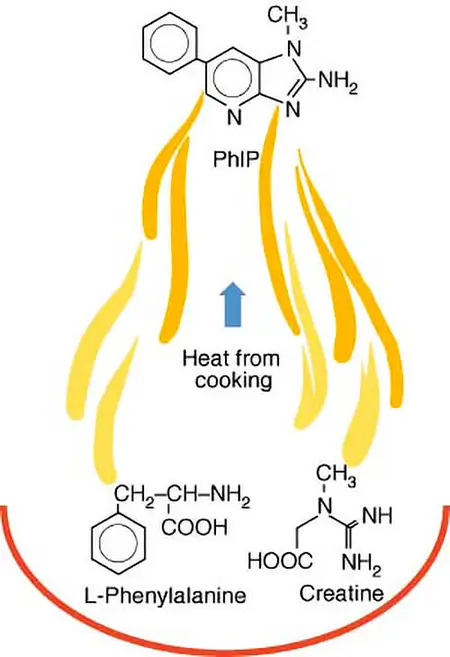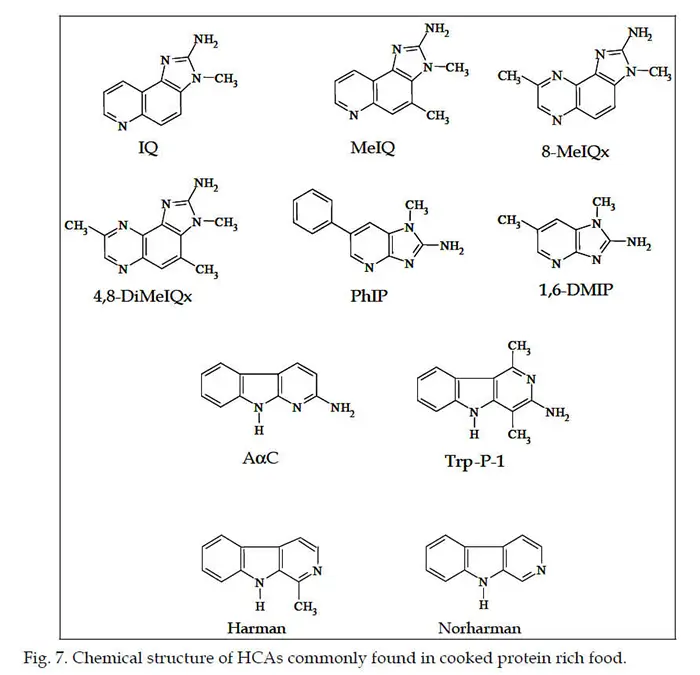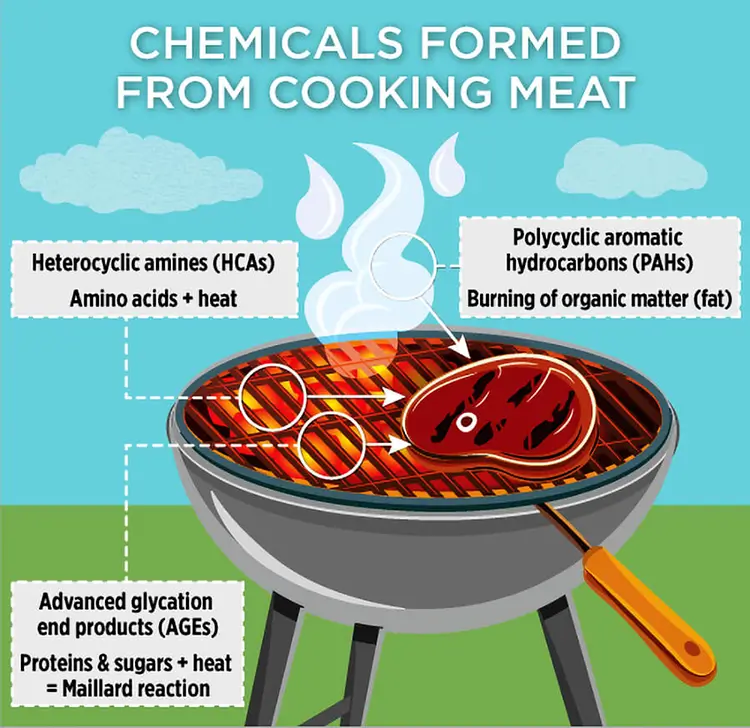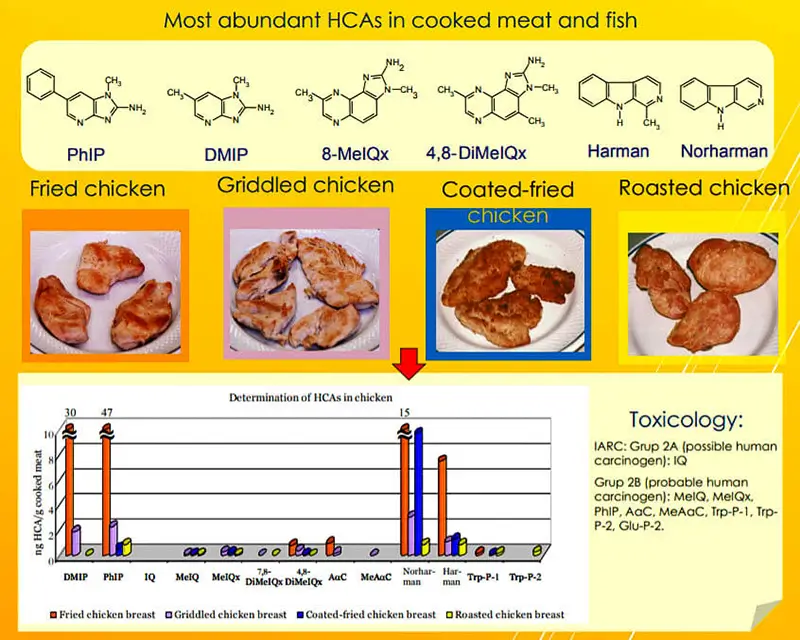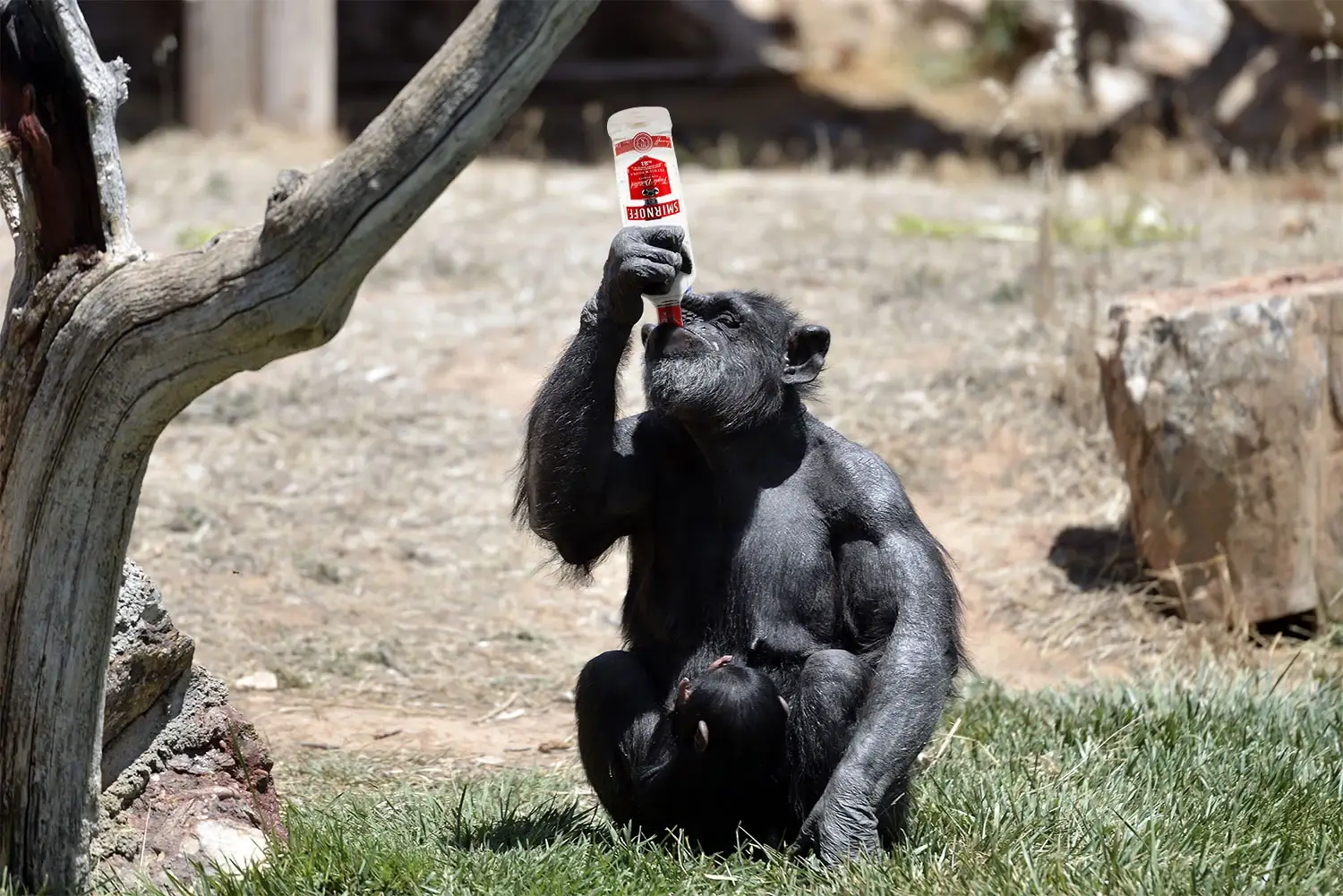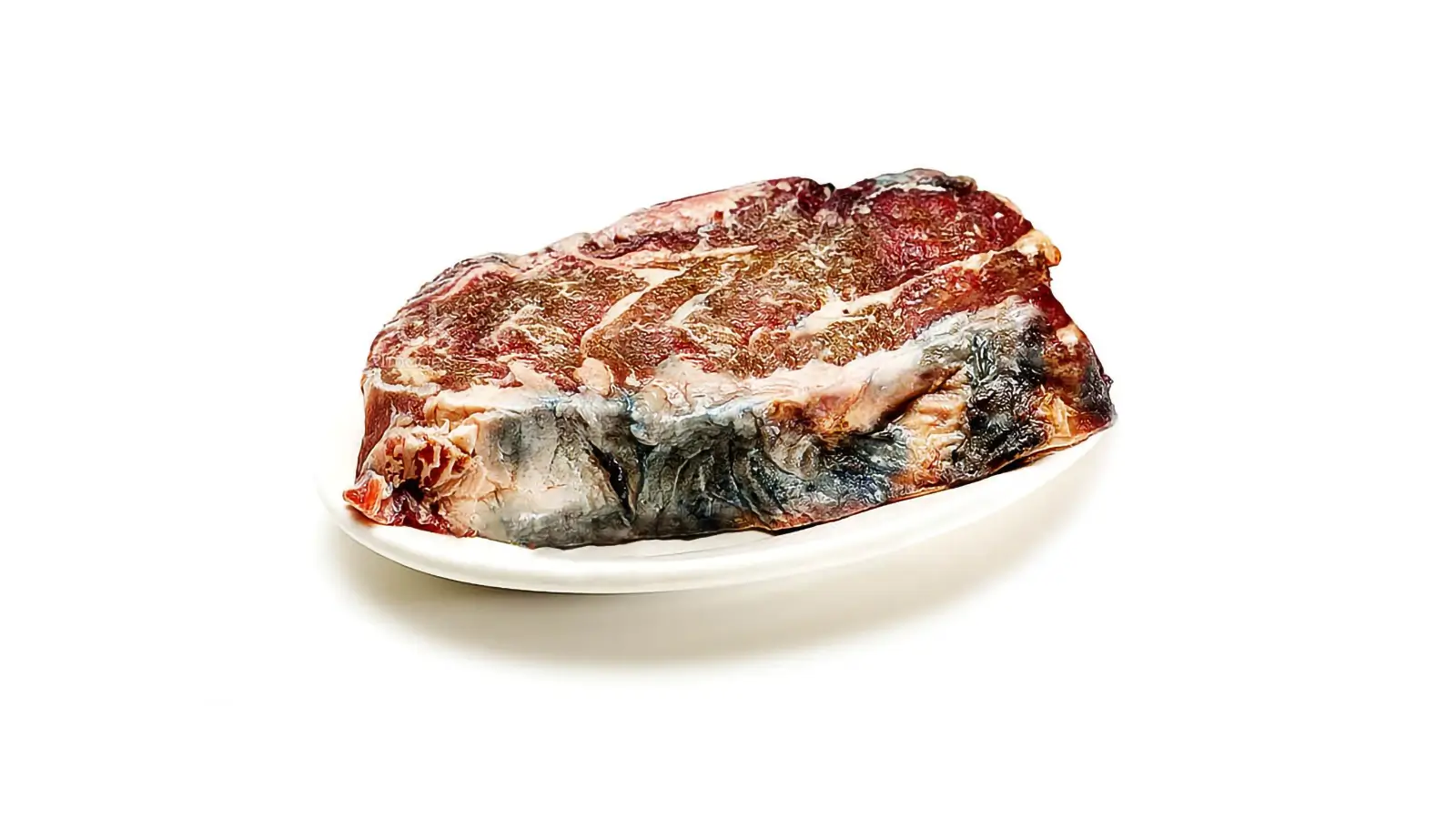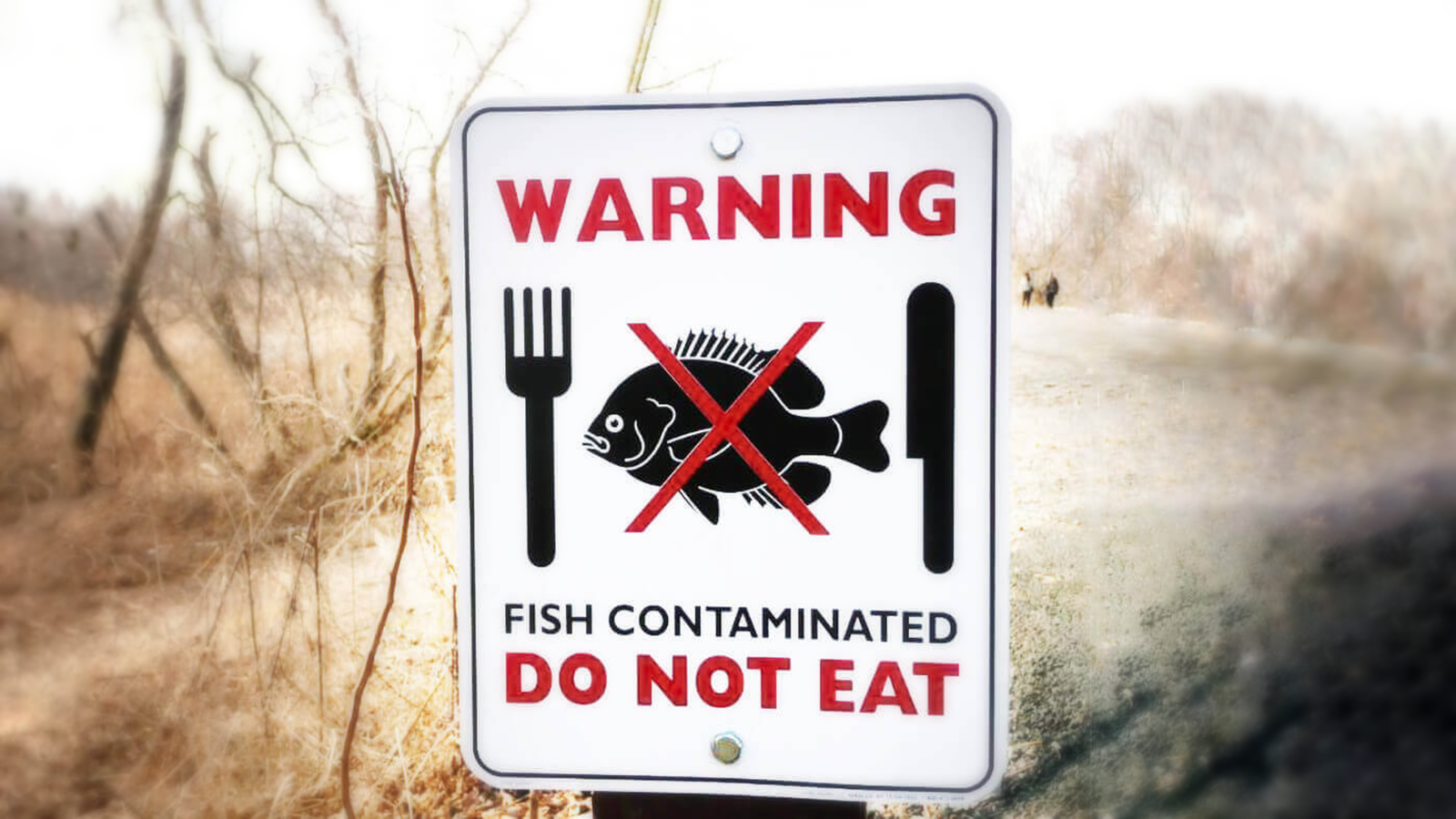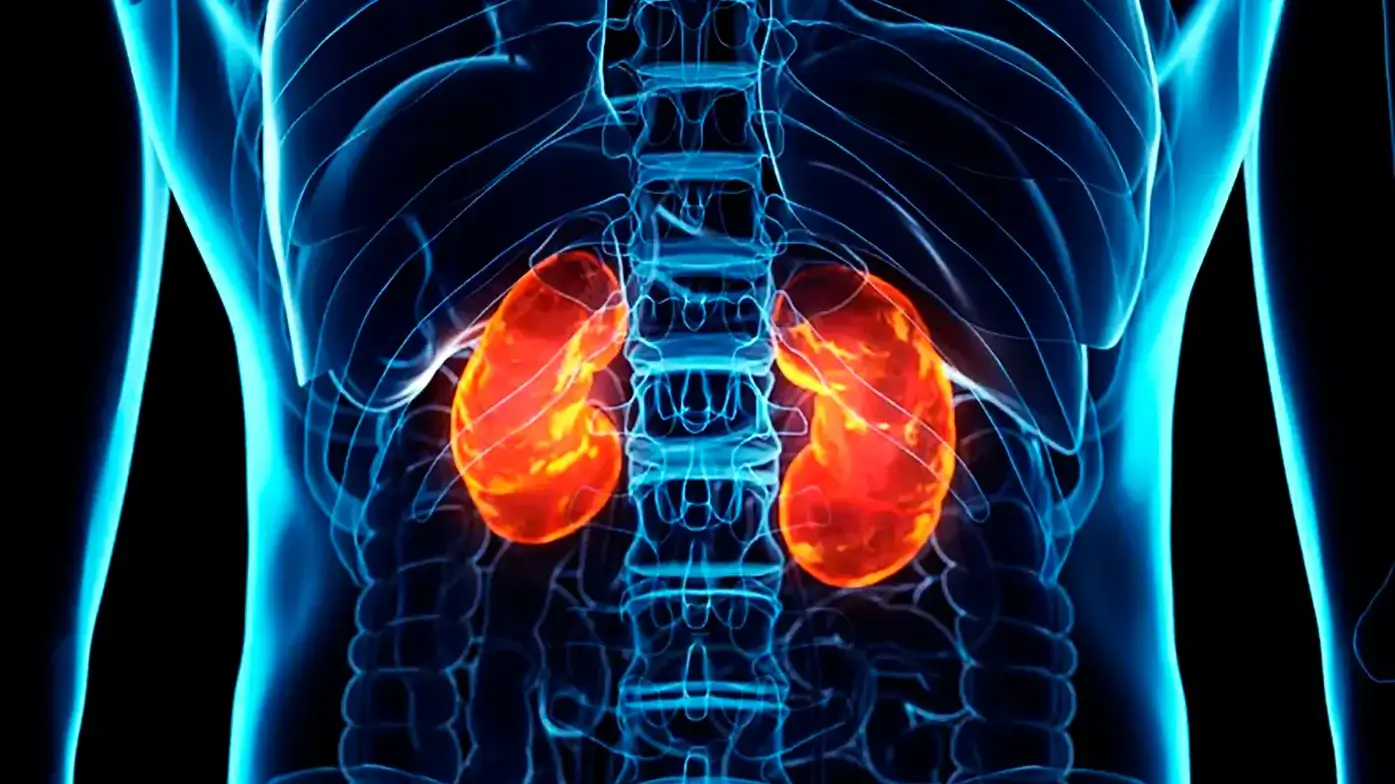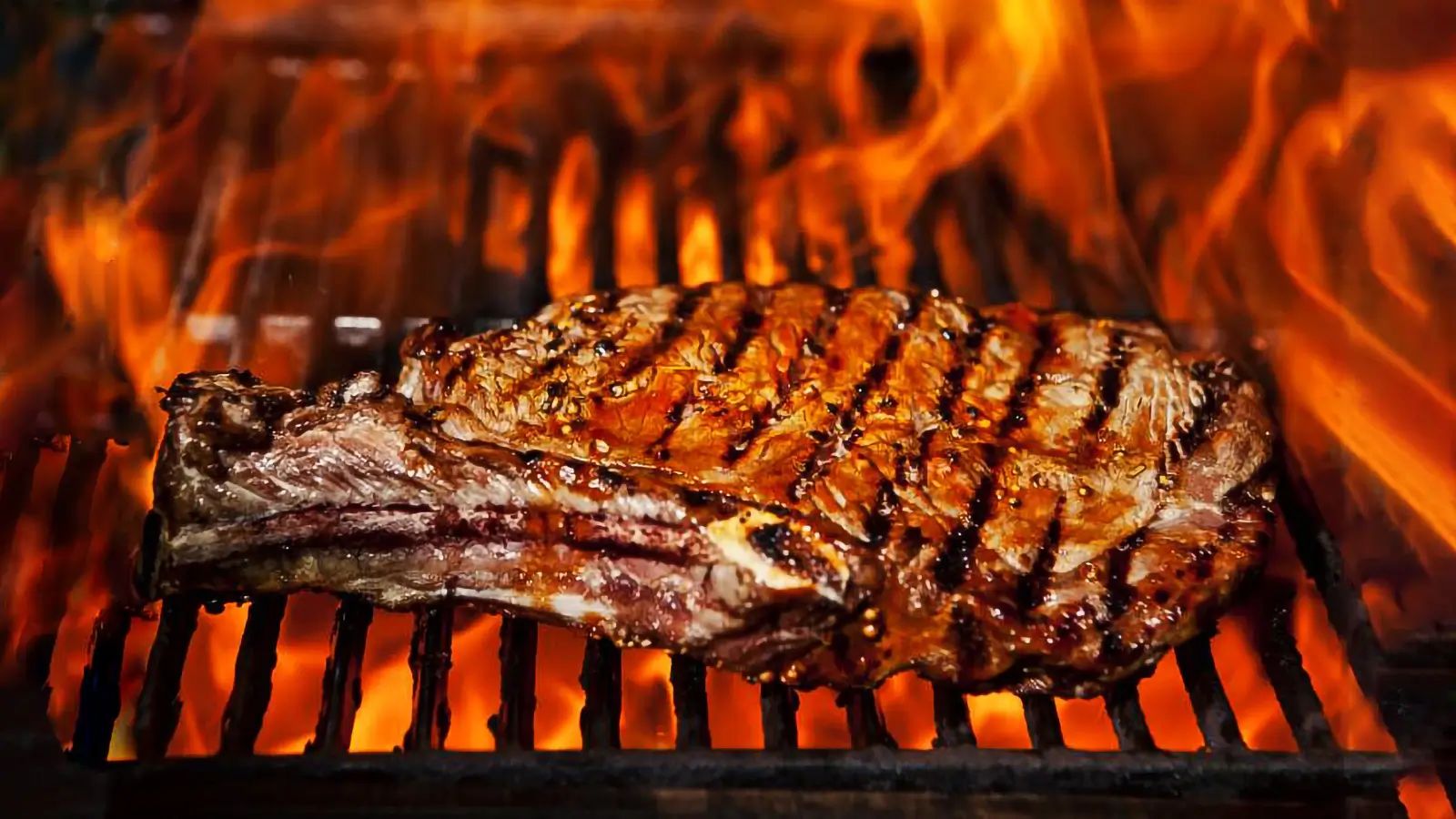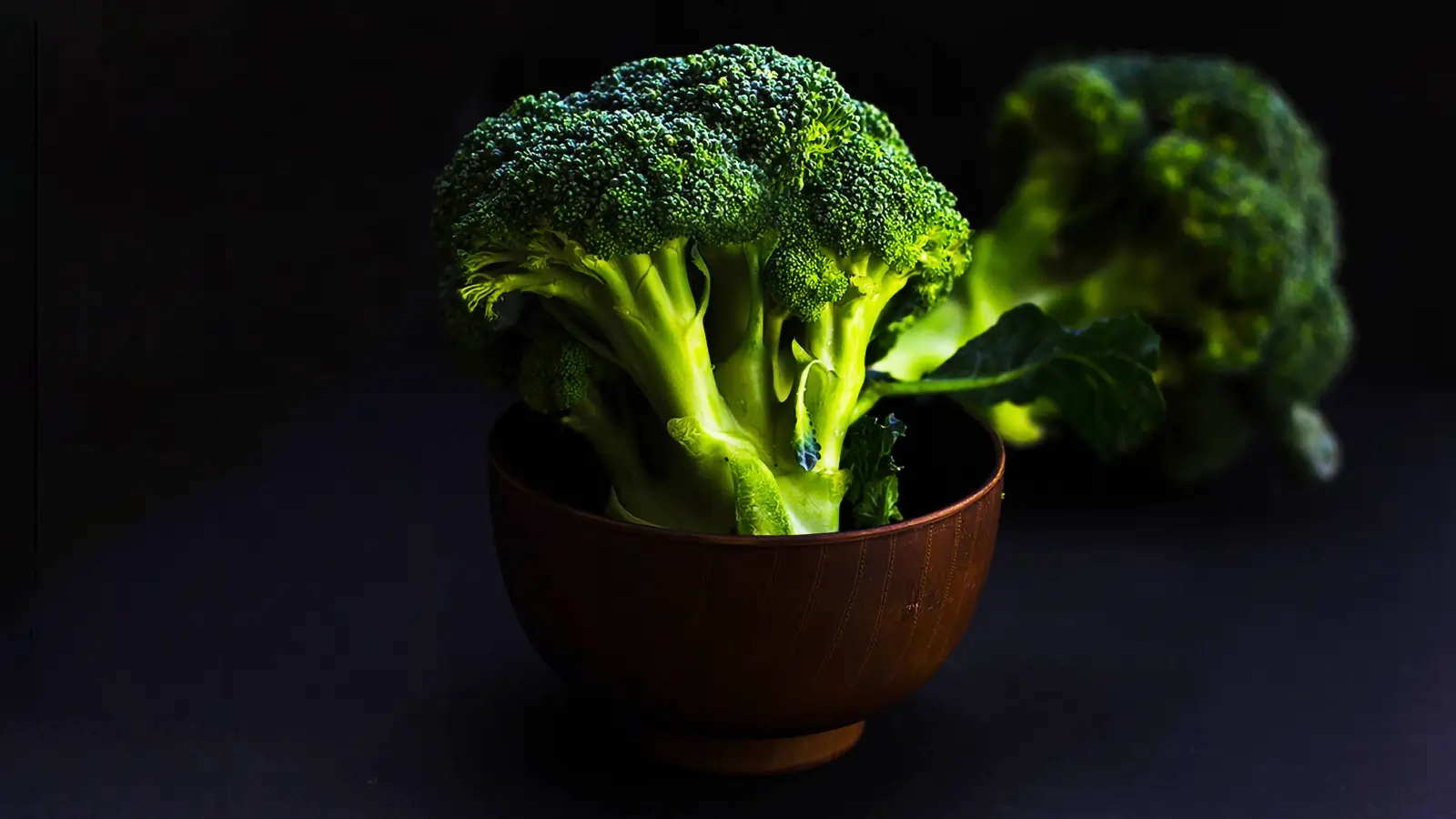Cooked Meat- The Mutagen in a Bite, Heterocyclic Amine Exposure
Heating of amino acids in the presence of creatine (cooked meat) creates mutagens known as Heterocyclic Amines (HCA).
Milos Pokimica
Written By: Milos Pokimica
Medically Reviewed by: Dr. Xiùying Wáng, M.D.
Updated June 9, 2023There is no known animal in nature except modern humans that grills meat. This is not an evolutionary congruent process that is causing serious maladaptation.
Heating of amino acids in the presence of creatine and monosaccharide sugars creates mutagens known as Heterocyclic Amines (HCA). Our body does not recognize them as different and integrates them into the cells. These amino acids have been damaged due to heating and their molecular form is changed. This integration into healthy cells causes mutations in DNA. Cancer is one of many correlated diseases.

Paleo people who like lean meat somehow forget that in the Paleo period most prehistoric people did not live long enough to die from cardiovascular disease or cancer or suffer from chronic diseases. In extremely harsh conditions where the average life expectancy is 32 years of age, the genes that get passed along to younger generations are the ones that are just old enough to go to reproductive age by any means necessary. That means not dying of starvation or disease or in an attack. The more calories we consume, the better no matter what they are. The meat cancer link is not really of any concern.
Eating raw meat from decaying carcasses is not our food. It would take just a couple of hours after death in climate conditions in Africa for meat to spoil.
Carnivorous species deal with bad microorganisms with strong stomach acid. The capacity of the carnivore stomach to emit hydrochloric acid is outstanding. Carnivores can hold their gastric pH all way down to around 1 or 2, even with food present. Strong gastric pH facilitates protein breakdown and is necessary to kill the abundant amount of dangerous microorganisms frequently found in rotting flesh. Their digestive tract is sterile and there is no large colon for fermenting fiber or other foods. Meat is digested in a couple of hours and excreted out. In carnivore animals, transit time is very short. Types of bacteria in the intestine are different also. When we eat a rotten apple, we might get drunk, but if we eat raw decaying flesh, there is an excellent possibility of severe consequences and death.
In certain conditions when there is an absolute need, the herbivorous animals will eat available meat only to survive. And the meat has to be cooked.
Let me give one example of how chronic diseases occur and progress so that we can start to understand this. The most common nervous system disorder of all neurological disorders is something called essential tremor (ET). It usually involves an involuntary shaking of the arms, hands, or fingers but sometimes it can also affect the head, vocal cords, or other body parts. It is a different condition than Parkinson’s disease but is often misdiagnosed as such. In most severe cases, ET interferes with a person’s activities of daily living, like dressing, taking care of personal hygiene, feeding, and is generally progressive in most cases. Some people have it in families so genetics plays a role and will develop symptoms at an early age but it is not bad genetics that is the real problem, and I will explain.
What happens is that when we heat amino acids (building blocks of protein) in the presence of creatine and monosaccharide sugars, they have a reaction and amino acids lose their molecular form.
What that means is that they are different but not that much, and that is the problem because our body does not recognize them as different. It thinks that they are just regular aminos. Meat cancer is a correlation caused by this mutagenicity of Heterocyclic Amines (HCA) but so are many other different conditions.
We are still not fully adapted to our new lifestyle and as a consequence what happens is that they start to be incorporated into our cells. Because their molecular structure is different, it causes problems in the form of mutations. Having mutations maybe sound like a good idea for an SF movie, but in real life it kills.
It causes changes to DNA. Meat heated at high temperatures, especially above 300 °F (as in grilling or pan-frying), or that is cooked for a long time, tends to form more of these mutated heterocyclic amines (HCAs).
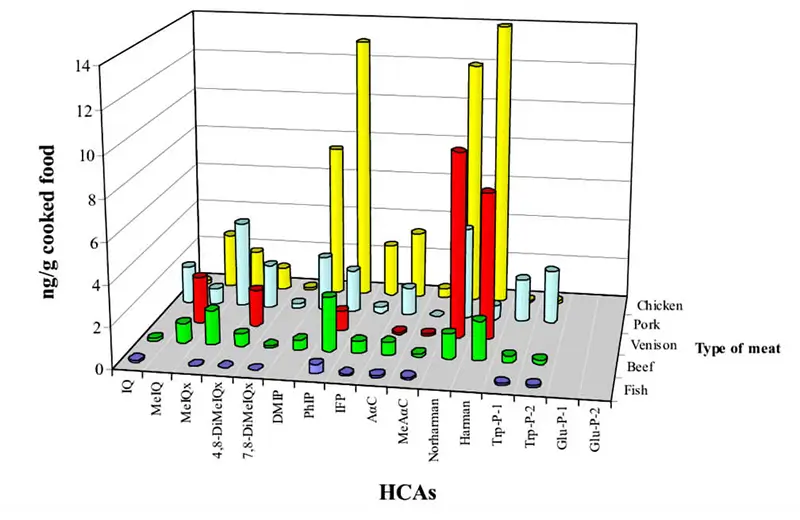
For example, well done, grilled, or barbecued chicken and steak all have extreme concentrations of Heterocyclic Amines (HCAs). Chicken is the worst of them all actually, with around two times more of this carcinogen than beef or pork. Marinating meat before cooking in some form of antioxidant-rich marinades like garlic or rosemary seems to help. Garlic at 20 gm/100 gm marinade reduced carcinogen production by about 70%. In contrast, regular barbecue sauce that contains much sugar caused a significant increase in chemical formation, tripling the levels after 15 minutes of cooking.
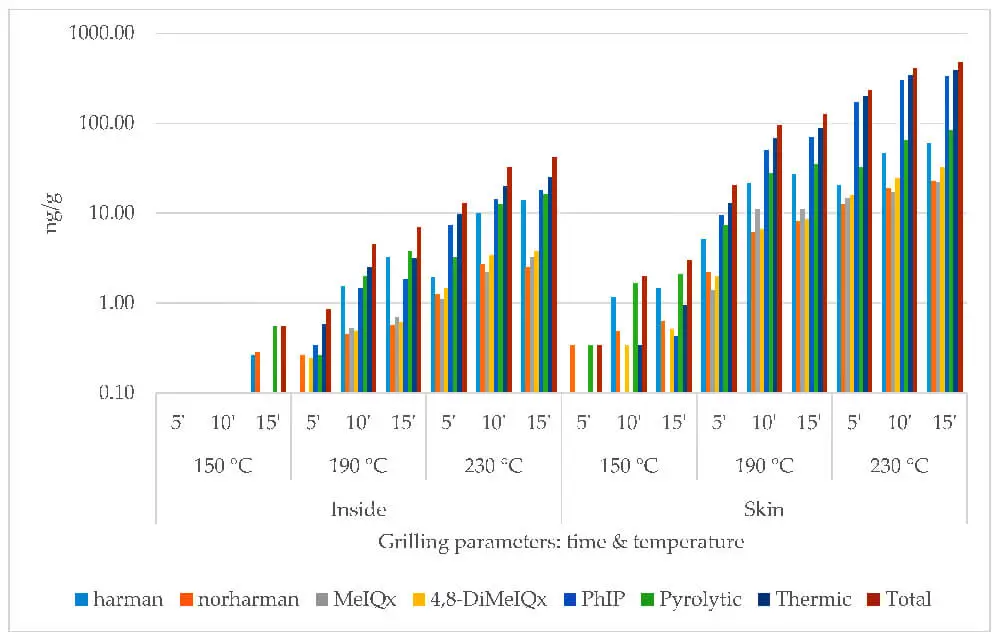
There is a list of different types of these messed-up heterocyclic Amines in cooked meat that are created. PhIP (2-Amino-1-methyl-6-phenylimidazopyridine) is the most abundant one. Long-term rodent studies confirmed that PhIP causes mammary gland and colon cancer. The most toxic and mutagenic of all is MeIQ. MeIQ is precisely 24 times more carcinogenic than aflatoxin, and aflatoxin is one of the most toxic substances ever created by mold. All of the other ones, and there are more than 20 HCAs, are more toxic than benzopyrene. Benzopyrene is a primary carcinogen that does the most damage in smokers and is found in cigarette smoke and coal tar.
Smoke actually at the same time during cooking creates a list of other different mutagens named polycyclic aromatic hydrocarbons (PAHs). Cooking techniques that expose meat to smoke or charring contribute to PAH formation. PAHs are created with the high-temperature cooking of meat. For example, when fat and juices from grilled meat drip and cause flames, the fumes will be filled with PAHs that will then adhere to the surface of the meat. Any form of burning can create them, for example, coal, oil, gas, wood, garbage, and tobacco have them too. They are also formed where smoke is used such as smoking of meats.
These unnatural mutagens (HCAs and PAHs) that are formed with unnatural activities such as grilling are capable of damaging DNA because of our lack of adaptation to them. The body has a line of specific enzymes to neutralize these mutagens.
Researchers have discovered that the action of those enzymes differs significantly among people. And that is a problem. In individuals who have lower levels of these enzymes, exposure to these compounds may be associated with an increase in cancer risks. Some of us can cope better with detoxifying these mutagens and some can’t and will have a higher risk of cancer. And that is what is called a genetic factor in medicine. It is not that we are born with bad genes, and that is it, you will get cancer or you will not. The situation is more complicated than that.
Of course, some level of cancer happens in animals too, but 23.4% of all deaths are not from genetics. It is an epidemic of biblical proportions because it is, in essence, a form of maladaptation to our environment.
One of the HCAs that is formed is Harmane. Harmane is a neurotoxin that is strongly associated with essential tremors. If exposed by injection mouse will develop an extreme tremor in just 3.1 minutes after the exposure and the tremor would last for hours. Because it is fat-soluble, it will accumulate over time in all fat tissues including the brain. It is found in elevated levels not just in the brains of ET patients but also in Parkinson’s disease. When compared to the control group Harmane concentration is precisely 50 percent higher in the brains of essential tremor patients. It is also elevated in blood samples too. If there is a patient that has a family history of essential tremor blood work results show the highest concentrations of all people.
Essential tremor is liver enzyme detoxification disease, a form of maladaptation. People with ET but without a family history will have little lower levels than people with a family history but still well above normal levels. Elevated Harmane in ET is due to an inherited reduction in the capacity to metabolize it out of the system. Same with any other disease, some people are more prone to it some less, but none of us are immune completely. That is why we see that with time the percentage of people with the disease goes up. From 4% in the 40s to 20% in the 90s. If we managed to live long enough most of us will eventually get it, except for the people who do not consume it. For each additional 10 grams/day of meat consumed, the odds of ET are increased by 6%.
Now you might not get ET, all of this is a just small example for logical understanding. You might just get cancer. The real difficulty is that there is a long list of different chronic diseases to make a pick from depending on individual genetics.
References:
Passages selected from a book: Pokimica, Milos. Go Vegan? Review of Science Part 1. Kindle ed., Amazon, 2018.
- Hopfner, Franziska, and Rick C. Helmich. “The Etiology of Essential Tremor: Genes Versus Environment.” Parkinsonism & Related Disorders, vol. 46, Elsevier BV, Jan. 2018, pp. S92–96. https://doi.org/10.1016/j.parkreldis.2017.07.014.
- Louis, Elan D et al. “Dietary epidemiology of essential tremor: meat consumption and meat cooking practices.” Neuroepidemiology vol. 30,3 (2008): 161-6. doi:10.1159/000122333
- Barzegar, Fatemeh et al. “Heterocyclic aromatic amines in cooked food: A review on formation, health risk-toxicology and their analytical techniques.” Food chemistry vol. 280 (2019): 240-254. doi:10.1016/j.foodchem.2018.12.058
- Sanz-Serrano, J et al. “Genotoxicity evaluation of fried meat: A comprehensive review.” Food and chemical toxicology : an international journal published for the British Industrial Biological Research Association vol. 136 (2020): 110943. doi:10.1016/j.fct.2019.110943
- Felton, J S et al. “Identification of the mutagens in cooked beef.” Environmental health perspectives vol. 67 (1986): 17-24. doi:10.1289/ehp.866717
- Heddle, J A et al. “A test of the mutagenicity of cooked meats in vivo.” Mutagenesis vol. 16,2 (2001): 103-7. doi:10.1093/mutage/16.2.103
- Shin, Aesun et al. “Meat and meat-mutagen intake, doneness preference and the risk of colorectal polyps: the Tennessee Colorectal Polyp Study.” International journal of cancer vol. 121,1 (2007): 136-42. doi:10.1002/ijc.22664
- Shabbir, Muhammad Asim et al. “Effect of thermal treatment on meat proteins with special reference to heterocyclic aromatic amines (HAAs).” Critical reviews in food science and nutrition vol. 55,1 (2015): 82-93. doi:10.1080/10408398.2011.647122
- Alaejos, M S et al. “Exposure to heterocyclic aromatic amines from the consumption of cooked red meat and its effect on human cancer risk: a review.” Food additives & contaminants. Part A, Chemistry, analysis, control, exposure & risk assessment vol. 25,1 (2008): 2-24. doi:10.1080/02652030701474235
- Pleva, Dániel et al. “Predictive Correlation between Apparent Sensory Properties and the Formation of Heterocyclic Amines in Chicken Breast as a Function of Grilling Temperature and Time.” Foods (Basel, Switzerland) vol. 9,4 412. 2 Apr. 2020, doi:10.3390/foods9040412
- Zheng, Wei, and Sang-Ah Lee. “Well-done meat intake, heterocyclic amine exposure, and cancer risk.” Nutrition and cancer vol. 61,4 (2009): 437-46. doi:10.1080/01635580802710741
Related Posts
Do you have any questions about nutrition and health?
I would love to hear from you and answer them in my next post. I appreciate your input and opinion and I look forward to hearing from you soon. I also invite you to follow us on Facebook, Instagram, and Pinterest for more diet, nutrition, and health content. You can leave a comment there and connect with other health enthusiasts, share your tips and experiences, and get support and encouragement from our team and community.
I hope that this post was informative and enjoyable for you and that you are prepared to apply the insights you learned. If you found this post helpful, please share it with your friends and family who might also benefit from it. You never know who might need some guidance and support on their health journey.
– You Might Also Like –

Learn About Nutrition
Milos Pokimica is a doctor of natural medicine, clinical nutritionist, medical health and nutrition writer, and nutritional science advisor. Author of the book series Go Vegan? Review of Science, he also operates the natural health website GoVeganWay.com
Medical Disclaimer
GoVeganWay.com brings you reviews of the latest nutrition and health-related research. The information provided represents the personal opinion of the author and is not intended nor implied to be a substitute for professional medical advice, diagnosis, or treatment. The information provided is for informational purposes only and is not intended to serve as a substitute for the consultation, diagnosis, and/or medical treatment of a qualified physician or healthcare provider.NEVER DISREGARD PROFESSIONAL MEDICAL ADVICE OR DELAY SEEKING MEDICAL TREATMENT BECAUSE OF SOMETHING YOU HAVE READ ON OR ACCESSED THROUGH GoVeganWay.com
NEVER APPLY ANY LIFESTYLE CHANGES OR ANY CHANGES AT ALL AS A CONSEQUENCE OF SOMETHING YOU HAVE READ IN GoVeganWay.com BEFORE CONSULTING LICENCED MEDICAL PRACTITIONER.
In the event of a medical emergency, call a doctor or 911 immediately. GoVeganWay.com does not recommend or endorse any specific groups, organizations, tests, physicians, products, procedures, opinions, or other information that may be mentioned inside.
Editor Picks –
Milos Pokimica is a health and nutrition writer and nutritional science advisor. Author of the book series Go Vegan? Review of Science, he also operates the natural health website GoVeganWay.com
Latest Articles –
Top Health News — ScienceDaily
- Hidden architecture inside cellular droplets opens new targets for cancer and ALSon February 26, 2026
Biomolecular condensates were long believed to be simple liquid blobs inside cells. Researchers have now uncovered that some are actually supported by fine protein filaments forming an internal scaffold. When this structure is disrupted, cells fail to grow and divide properly. The discovery suggests scientists may one day design drugs that target condensate architecture to fight cancer and neurodegenerative disease.
- The more you fear aging, the faster your body may ageon February 26, 2026
Worrying about getting older—especially fearing future health problems—may actually speed up aging at the cellular level, according to new research from NYU. In a study of more than 700 women, those who felt more anxious about aging showed signs of faster biological aging in their blood, measured using cutting-edge “epigenetic clocks.” Fears about declining health had the strongest link, while concerns about beauty or fertility didn’t appear to have the same biological impact.
- Popular acid reflux medication linked to anemia and bone losson February 26, 2026
Popular acid reflux drugs such as Prilosec, Nexium, and Protonix may carry hidden risks when taken long term. A new study found that extended use disrupted iron and calcium levels in rats, changes associated with anemia and osteoporosis risk. Researchers also observed shifts in mineral balance across multiple organs. Experts say the medications are effective, but prolonged use without medical guidance could have unintended consequences.
- Study finds vegetarians over 80 less likely to reach 100on February 26, 2026
Avoiding meat might slightly lower the odds of reaching 100 — but only for frail, underweight seniors. In very old age, staying strong and maintaining muscle matters more than long-term disease prevention. Older adults who included fish, eggs, or dairy were just as likely to become centenarians as meat eaters, suggesting that key nutrients may make the difference. The takeaway: nutrition needs change dramatically with age.
- Shingles vaccine may slow biological aging and reduce inflammationon February 26, 2026
A shingles shot might do more than prevent a painful rash — it could actually help slow down the aging process. In a large national study of more than 3,800 Americans age 70 and older, those who received the shingles vaccine showed slower biological aging compared to those who didn’t. Researchers found lower levels of chronic inflammation and slower changes in gene activity linked to aging, suggesting the vaccine may calm the body’s “inflammaging” — the low-grade inflammation tied […]
- Massive review suggests exercise may do little for osteoarthritis painon February 26, 2026
A sweeping new analysis of the evidence suggests that exercise therapy — long promoted as a first-line treatment for osteoarthritis — may offer only small and short-lived relief, and in some cases might be no better than doing nothing at all. After reviewing dozens of clinical trials involving more than 13,000 participants, researchers found that benefits for knee osteoarthritis pain were minimal and tended to shrink in larger or longer-term studies.
- Just two days of oatmeal cut bad cholesterol by 10%on February 25, 2026
Eating nothing but oatmeal for just two days might sound extreme, but it delivered a striking payoff in a new clinical trial. People with metabolic syndrome who followed a short, calorie-reduced oat-based plan saw their harmful LDL cholesterol drop by 10%, along with modest weight loss and lower blood pressure. Even more surprising, the cholesterol benefits were still visible six weeks later.
PubMed, #vegan-diet –
- Veganism: an extended theory of planned behavior framework incorporating ethical, environmental, and sociodemographic determinantson February 20, 2026
CONCLUSION: This study broadens the TPB by integrating ethical, normative, and psychosocial dimensions that explain vegan intentions beyond traditional predictors. Findings underscore the importance of moral identity, perceived social expectations, and contextual factors in shaping sustainable dietary behaviors.
- Association Between Diet and Metabolome in Childhood and Adolescence: A Systematic Reviewon February 11, 2026
CONCLUSION: This review identifies several metabolites consistently associated with specific dietary components across different studies in children and adolescents. These findings support the potential of metabolomics for validating dietary biomarkers and improving the accuracy of dietary assessment in pediatric populations. Although metabolomic markers reflect actual dietary intake, their implications for health outcomes remain to be explored.
- Growth Trajectories in Infants From Families With Plant-Based or Omnivorous Dietary Patternson February 5, 2026
CONCLUSIONS AND RELEVANCE: In this cohort study, infants from vegan households had growth patterns similar to those from omnivorous households, with a higher odds of early underweight that decreased by age 24 months. In the context of developed countries, these findings seem reassuring. Further research should examine vegan diet quality and the impact of nutritional counseling during pregnancy and infancy in supporting optimal infant development.
- Influences of vegan status on protein intake, lean body mass, and strength in lightly active, young women: A cross-sectional studyon February 5, 2026
CONCLUSION: These data suggest that functional indicators of body protein status may be adversely impacted by long-term adherence to vegan diets in young adult women.
- Iodineon January 1, 2006
Iodine is an essential trace nutrient for all infants that is a normal component of breastmilk. Infant requirements are estimated to be 15 mcg/kg daily in full-term infants and 30 mcg/kg daily in preterm infants.[1] Breastmilk iodine concentration correlates well with maternal urinary iodine concentration and may be a useful index of iodine sufficiency in infants under 2 years of age, but there is no clear agreement on a value that indicates iodine sufficiency, and may not correlate with […]
Random Posts –
Featured Posts –
Latest from PubMed, #plant-based diet –
- Impact of nutrition on long COVIDby Subramanian Thangaleela on February 25, 2026
Long COVID is characterized by a group of persistent symptoms following the acute SARS-COV2 infection, which presented a multifaceted challenge to the healthcare systems all over the globe. The long COVID symptoms span various organ systems including the respiratory, cardiovascular, gastrointestinal, and neurological manifestations. Mitochondrial dysfunction and immune dysregulation play crucial roles in the long COVID pathophysiology. Recently nutritional intervention gained much attention […]
- Lifestyles, leisure activities, subjective well-being, and long-term survival after age 80 in China: a population-based cohort studyby Xinye Zou on February 25, 2026
CONCLUSIONS: The study findings have demonstrated that adopting a healthy lifestyle, engaging in leisure activities, and fostering subjective well-being are associated with longer life expectancy among the oldest old in China.
- Differences in Protein Quantity and Quality Across a Spectrum of Plant-Based Meals: Analysis of a Large National Dietary Surveyby Sophie L van Oppenraaij on February 24, 2026
CONCLUSIONS: This study shows that only a small proportion of Dutch adults met both protein-related recommendations and sustainability goals, due to lower protein quantity and quality in more plant-based diets. This study emphasizes the need for professional guidance, especially in individuals with higher protein requirements, to facilitate a successful transition to a more plant-based diet.
- Dietary animal fat disrupts gut microbiota and aggravates Scl-cGVHD after allogeneic hematopoietic stem cell transferby Danielle D Millick on February 24, 2026
Allogeneic hematopoietic stem cell transplant (allo-HSCT) is an effective treatment for high-risk or relapsed acute leukemia. However, the frequent occurrence of graft-versus-host disease (GVHD) poses significant complications. Modifiable factors such as the gut microbiome and dietary regimen have the potential to influence the frequency and severity of GVHD. Previous studies in mouse models have shown a direct link between obesity and increased severity of GVHD; however, analysis of human […]
- Association between the adherence to different dietary patterns and sperm chromatin integrity in healthy menby Marc Llavanera on February 24, 2026
CONCLUSION: To the best of our knowledge, this study is the first to epidemiologically investigate the relationship between dietary patterns and sperm chromatin integrity, highlighting that adherence to unhealthy plant-based diets may lead to sperm chromatin abnormalities. These findings underscore the potential effect of specific dietary patterns on molecular sperm quality parameters and support further research into dietary strategies for optimizing sperm integrity and improving male…
- Evaluation of biochemical, histopathological, hematological, and genotoxic effects of some indigenous weed plant extracts in albino rats toward a natural and safe alternative to synthetic insecticidesby Muhammad Asif Zahoor on February 23, 2026
CONCLUSION: These findings suggest that these weed plants have the potential to be used as biopesticides for future integrated pest management (IPM) programs.

